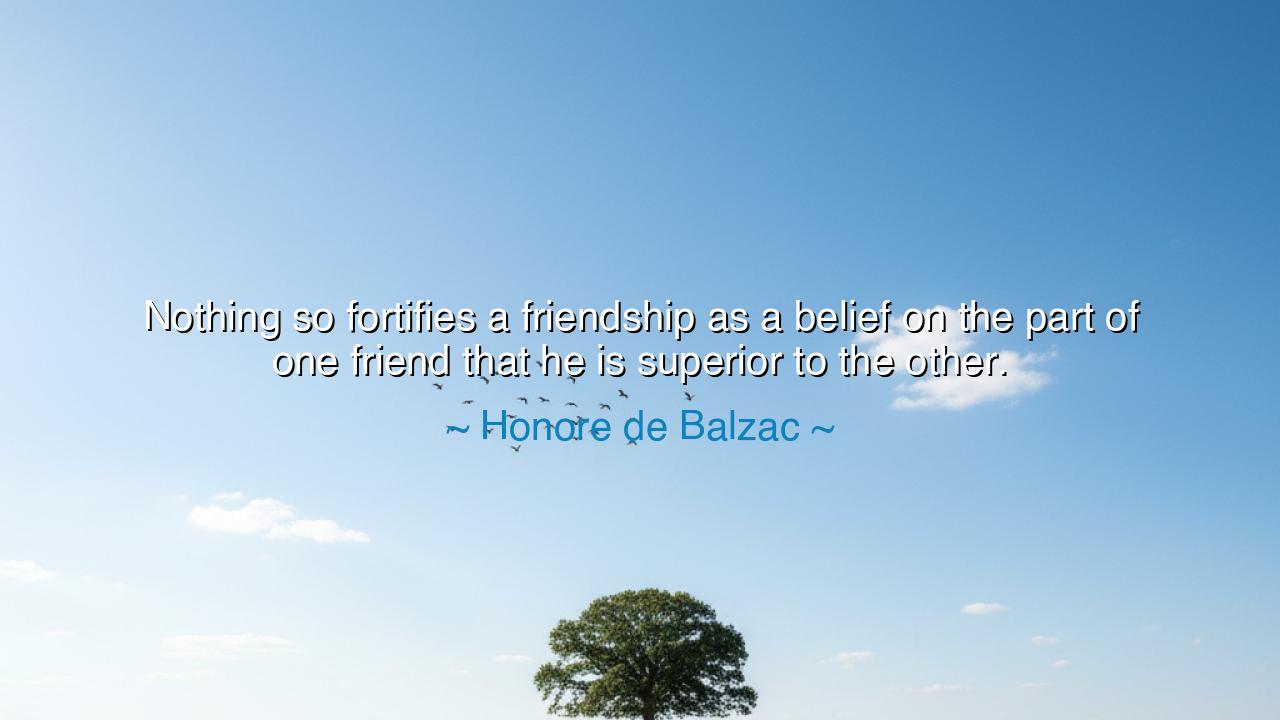
Nothing so fortifies a friendship as a belief on the part of one
Nothing so fortifies a friendship as a belief on the part of one friend that he is superior to the other.






“Nothing so fortifies a friendship as a belief on the part of one friend that he is superior to the other.” Thus wrote Honoré de Balzac, the keen observer of human nature, whose pen laid bare the secret gears of the human heart. In these few words, he reveals one of the more unsettling truths of friendship — that it is often sustained not only by love or loyalty, but by the subtle balance of power between two souls. His saying, though wrapped in irony, carries the weight of experience. For Balzac, who had seen both the tenderness and the vanity of human relationships, understood that pride — that ancient shadow within the heart — often shapes the very bonds we call sacred.
At first glance, his words seem harsh, even cynical. Yet beneath them lies an ancient wisdom, both psychological and moral. Balzac does not praise pride, but he exposes its power. In many friendships, one heart feels the need to guide, to protect, to teach, while the other, willingly or not, accepts the role of the one being guided. The one who feels superior — wiser, kinder, or stronger — takes satisfaction in his imagined generosity. He believes himself the giver, the anchor, the protector. This belief feeds his sense of virtue, and thus he cherishes the friendship as proof of his own goodness. The other, in turn, finds comfort in admiration and loyalty, and so the bond endures — a union built not on equality, but on the delicate dance of pride and gratitude.
Balzac lived in the age of salons and aristocratic intrigue, where social ties were woven with threads of ambition as much as affection. He saw that human beings, even in their friendships, seek recognition — to feel valued, admired, or needed. To feel superior, in the sense Balzac describes, is not always malicious; it is often the quiet wish to matter in the life of another. In this, his observation echoes an ancient truth found even in the writings of the Stoics: that man’s greatest desire is not wealth, but significance. And so, the friend who believes himself indispensable to another, whose advice is sought and whose strength is trusted, finds his affection strengthened, not diminished, by that belief.
Consider the story of Aristotle and Alexander, the philosopher and his student. Aristotle, the great mind of Greece, taught the young prince wisdom and virtue, shaping him into a conqueror of worlds. For years, their friendship was deep, born of mutual admiration. Yet it was fortified by Aristotle’s belief in his own superiority — the master guiding his pupil. In that belief, Aristotle found purpose, and Alexander found inspiration. But as Alexander’s power grew, and the student surpassed the teacher, the bond faltered. The illusion of superiority, once the root of strength, became the seed of division. Thus, Balzac’s truth unfolds: friendship built on uneven ground can stand strong for a time, but only as long as pride is fed.
Yet there is another layer to Balzac’s wisdom — one that invites both caution and compassion. He does not command us to seek superiority in friendship, but to recognize it when it arises. For human hearts are not forged equal in strength or spirit, and imbalance often weaves itself into the fabric of companionship. The wise must learn to handle such imbalance with grace. If you are the stronger, let your superiority be gentle; let it lift, not diminish. If you are the weaker, accept guidance without surrendering your worth. The art of friendship lies not in erasing difference, but in balancing it with humility and respect.
Balzac’s words, though veiled in irony, challenge us to look inward — to ask whether our friendships are founded on truth or illusion. Do we love our friends for who they are, or for how they make us feel about ourselves? Do we offer affection freely, or do we seek in it a mirror for our vanity? To see this clearly requires courage, for friendship, like all human bonds, is a mirror of the soul. And when that mirror reveals pride instead of purity, we must not despair; for even pride, when tempered by love, can become a path toward understanding.
Therefore, my child, take this lesson to heart: seek equality in spirit, not in power. When you find yourself the stronger, use your strength to uplift, not to rule. When you find yourself the lesser, honor your friend without surrendering your dignity. Friendship is not a contest of superiority, but a harmony of differences. Yet Balzac’s wisdom endures because it reminds us that the heart is never free of pride — it must be watched, guided, and humbled by love.
For in the end, the greatest friendship is not that which flatters our pride, but that which transforms it into compassion. To feel superior is human; to rise beyond that feeling, and still love with sincerity, is divine. And when two souls learn to do this — to stand together, neither above nor below, but side by side — then, and only then, will their friendship be unshakable, fortified not by pride, but by truth.






AAdministratorAdministrator
Welcome, honored guests. Please leave a comment, we will respond soon